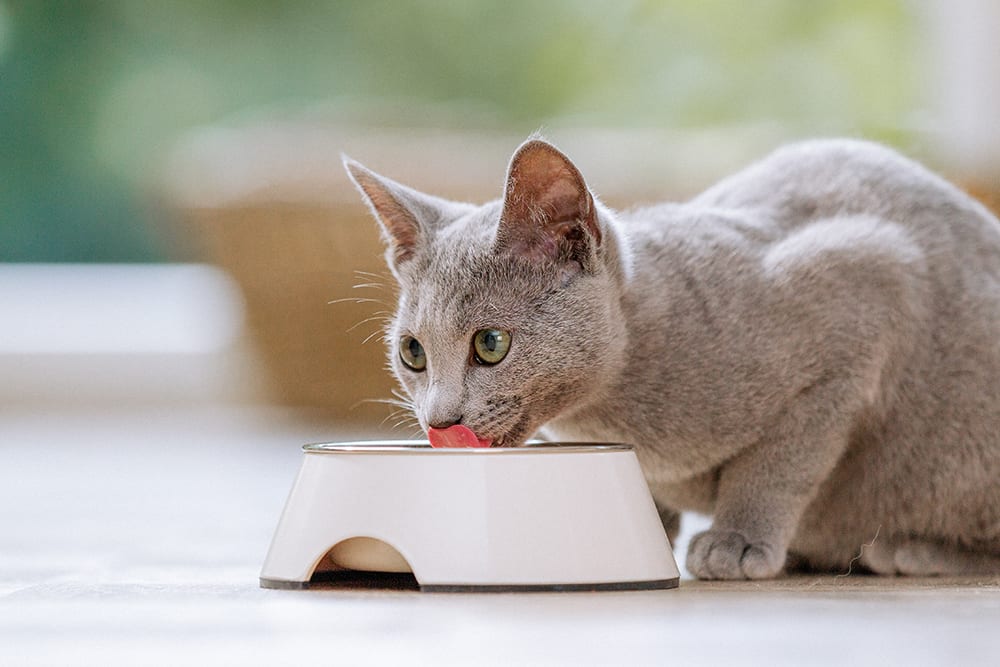Your Cat's Body Temperature
Heatstroke occurs when your kitty's body temperature rises above normal levels, typically above 102.5°F (39.2°C). Cats can suffer from heatstroke if they are exposed to high temperatures for prolonged periods or if they are unable to find a cool spot to escape the heat.
Heatstroke is a serious condition that can lead your feline friend to experience severe symptoms including organ failure, seizures, and even death if not treated promptly!
Why Cats Get Heatstroke
Cats are incredibly sensitive to heat, but unlike humans, they lack the ability to sweat efficiently to cool down.
In cats and dogs, heatstroke is typically caused by exposure to excessive ambient heat combined with their body's inabli. Some of the most common causes of heatstroke in cats include:
- Extremely hot outdoor temperature
- Lack of access to shade
- Trapped in hot unventilated space (such as a car)
- Lack of access to water
Heatstroke Symptoms in Cats
Recognizing the early signs of heatstroke is crucial in providing prompt care for your feline friend. Common signs of heatstroke in cats include:
- Excessive Panting
- Restless behavior
- Sweaty feet
- Vomiting
- Lethargy
- Muscle Tremors
- Drooling
- Excessive grooming
- Uncoordinated movement
- Loss of Balance
- Seizure
- Unconsciousness
What To Do If Your Cat Has Heatstroke
Heatstroke is a serious condition and symptoms should always be treated as an emergency! If your cat is displaying signs of heatstroke head to your vet straight away, or go to the nearest animal emergency hospital.
If your cat is conscious and you suspect that they may be suffering from heatstroke, move your cat into a cool room and wet your cat's fur with cool (NOT COLD) water, then place ice packs gently on your cat's feet.
While transporting your cat to the vet keep the vehicle's air conditioning on full or open windows to allow airflow to help cool your cat down.
How to Treat Heatstroke in Cats
Your vet will work to reduce your cat's body temperature back down to normal. This may be done using cool water and/or ice packs.
Your vet may also administer intravenous fluids to help to lower your cat’s temperature, counteract the effects of shock and minimize the risk of organ damage. In some cases oxygen therapy may also be required.
The team at your vet's office will monitor your cat's body temperature every few minutes until your pet's body temperature is back within normal parameters. If caught early and treated immediately cats can recover quickly from heatstroke.
That said, heatstroke poses a very serious health risk to cats and dogs. Your vet will examine your cat for signs of organ damage and other serious complications before allowing your pet to return home. In some cases, evidence of organ damage does not become apparent for a number of days, be sure to carefully monitor your cat for signs of illness if they have recently recovered from heatstroke.
Preventing Heatstroke in Cats
To prevent your cat from getting heatstroke, always provide your kitty with access to a cool, shady space to relax in on hot days, make sure that your feline friend has access to plenty of fresh clean water to drink, and never leave your pet trapped in a vehicle or hot room.
Note: The advice provided in this post is intended for informational purposes and does not constitute medical advice regarding pets. For an accurate diagnosis of your pet's condition, please make an appointment with your vet.
Is your kitty showing signs of heatstroke? Contact our Cordova vet right away for urgent care!
Looking for a vet in Cordova or the Greater Memphis area?
We're always accepting new patients, so contact our veterinary hospital today to book your pet's first appointment.
Related Articles View All
Cats & Colds: Can They Get Them & What To Do?
Many people don't know that our cats can get sick, but they can catch colds just like we can! A cat with a cold will display similar symptoms as humans do such as sneezing and a runny nose. Here, our Cordova vets talk about the causes of cat colds and when to seek veterinary care.
Do cats get depressed?
Cats are known for their independent yet playful characters. So, if your cat seems sad, you're bound to be concerned. Today, we discuss signs of depression in cats, potential causes of cat depression, and what can be done to help your feline friend banish the blues.
My cat sleeps constantly, should I be worried?
No doubt about it, cats love to sleep. But how much is too much? Today, you will discover reasons why cats sleep so much and learn when to be concerned about your cat's sleeping habits.
What To Do If Your Cat or Dog Having Difficulty Breathing
Does your cat or dog's panting mean that they're having breathing difficulties? Today, our Cordova vets look at breathing difficulties in dogs and cats, and how they are treated.

